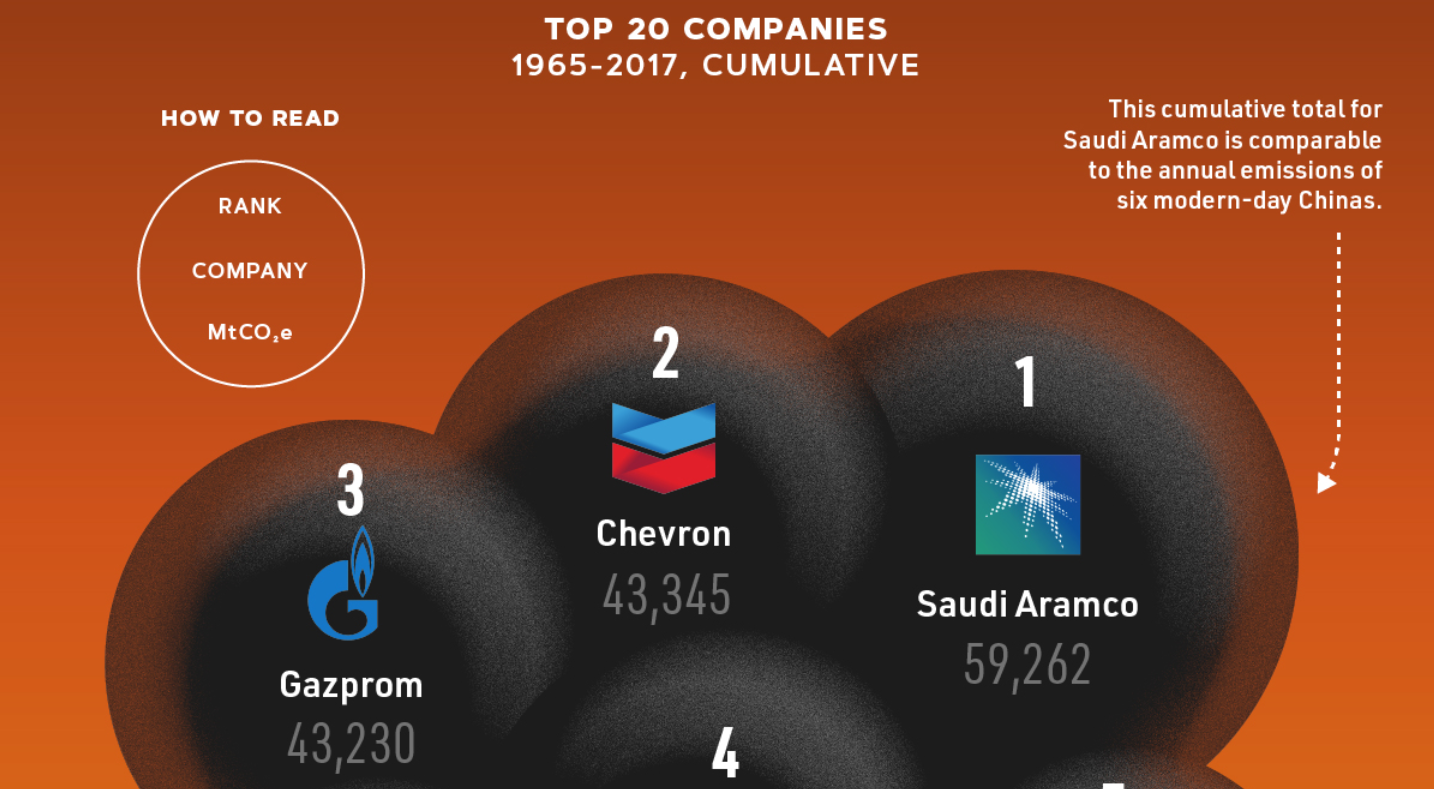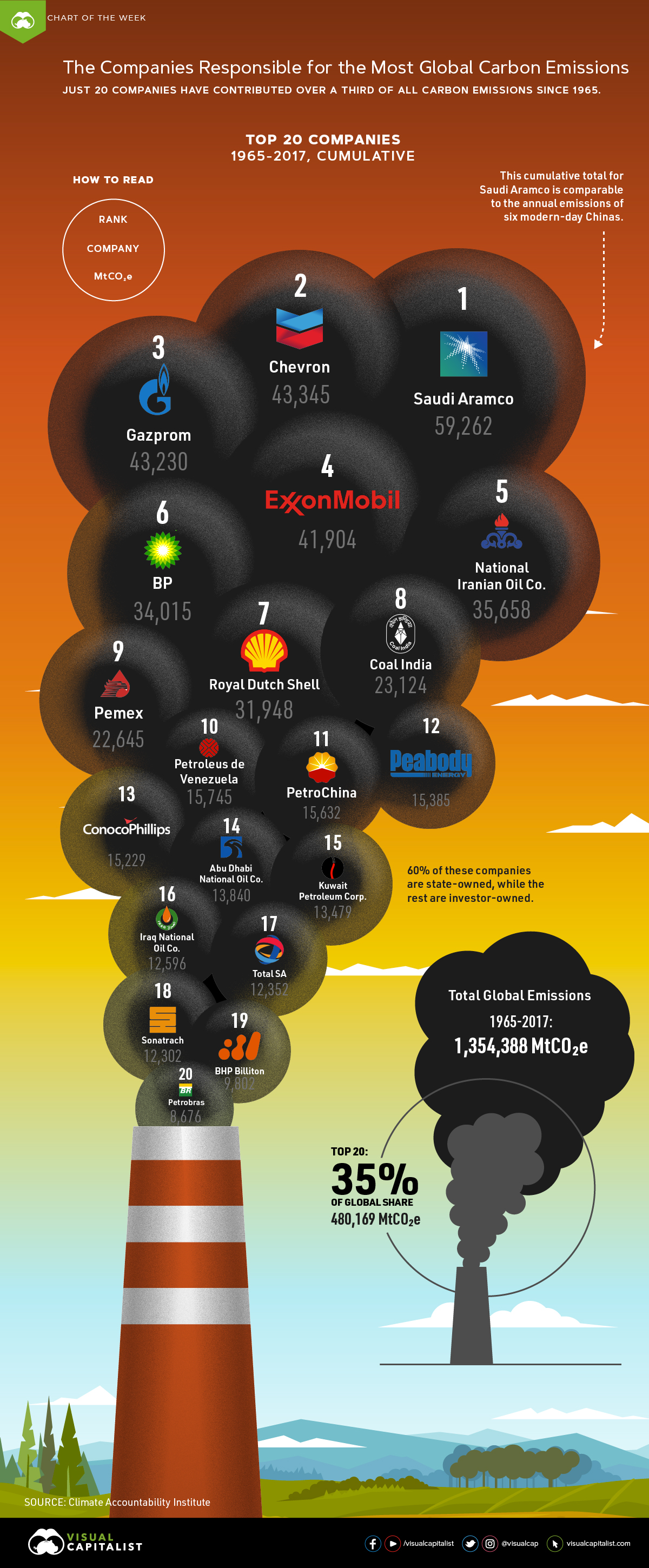Since 1965, it’s estimated over 1.35 million metric tons (MtCO₂e) of greenhouse gases have been released into the atmosphere—and over a third can be traced back to just 20 companies.
Q3 2019 hedge fund letters, conferences and more
This week’s chart draws on a dataset from the Climate Accountability Institute, and highlights the companies which have been responsible for the most carbon emissions in the past half-century.
The Sum of their Carbon Emissions
Between 1965-2017, the top 20 companies have contributed 480,169 MtCO₂e in total carbon emissions, or 35% of cumulative global emissions. This whopping amount is mostly from the combustion of their products—each company on this chart deals in fossil fuels.
The largest contributor? Saudi Aramco, the national petroleum and natural gas company of Saudi Arabia. Saudi Aramco actually comes in first on another list as well—it’s the most profitable company, making over $304 million daily.
However, this financial gain came at a significant cost: the state-owned giant’s operations have resulted in 59,262 MtCO₂e in carbon emissions since 1965. To put that into perspective, this total is more than six times China’s emissions in 2017 alone (9,838 MtCO₂e).
Explore the full list of companies by location, who owns them, and their total 1965–2017 emissions count below:
| Company | Country | Ownership | All Emissions, MtCO₂e |
| Total Emissions | 480,169 MtCO₂e | ||
| Saudi Aramco | Saudi Arabia | State-owned | 59,262 |
| Chevron | U.S. | Investor-owned | 43,345 |
| Gazprom | Russia | State-owned | 43,230 |
| Exxron Mobil | U.S. | Investor-owned | 41,904 |
| National Iranian Oil Co. | Iran | State-owned | 35,658 |
| BP | UK | Investor-owned | 34,015 |
| Royal Dutch Shell | Netherlands | Investor-owned | 31,948 |
| Coal India | India | State-owned | 23,124 |
| Pemex | Mexico | State-owned | 22,645 |
| Petroleus de Venezuela | Venezuela | State-owned | 15,745 |
| PetroChina | China | State-owned | 15,632 |
| Peabody Energy | U.S. | Investor-owned | 15,385 |
| ConocoPhillips | U.S. | Investor-owned | 15,229 |
| Abu Dhabi National Oil Co. | UAE | State-owned | 13,840 |
| Kuwait Petroleum Corp. | Kuwait | State-owned | 13,479 |
| Iraq National Oil Co. | Iraq | State-owned | 12,596 |
| Total SA | France | Investor-owned | 12,352 |
| Sonatrach | Algeria | State-owned | 12,302 |
| BHP Billiton | Australia | Investor-owned | 9,802 |
| Petrobras | Brazil | State-owned | 8,676 |
A Greener Business Model?
According to the researchers, all the companies that show up in today’s chart bear some responsibility for knowingly accelerating the climate crisis even after proven scientific evidence.
In fact, U.S.-based Exxon Mobil is currently on trial for misleading investors: the company downplayed the effect of climate change on its profitability, while internal calculations proved to be much larger. It also sowed public doubt on the immense impacts of rising greenhouse gas levels on the planet.
Growing sustainability and environmental concerns threaten the viability of old business models for these corporations, causing many to pivot away from the fossil fuel focus. Take BP for example—originally named British Petroleum, the company embraced “Beyond Petroleum” as its new rallying cry. More recently, it launched a carbon footprint calculator and is committed to keeping its carbon emissions flat into 2025.
The first step to reducing your emissions is to know where you stand. Find out your #carbonfootprint with our new calculator & share your pledge today!
— BP (@BP_plc) 22 October 2019
However, the Climate Accountability Institute argues that more can still be done, with the researchers calling for these companies to reduce their fossil fuel production in the near future.
Continued pressure on these “Big Oil” companies to peak their carbon emissions, and urgently increase their renewable energy investment, may help curb the climate crisis before it’s too late.
Article by Visual Capitalist


